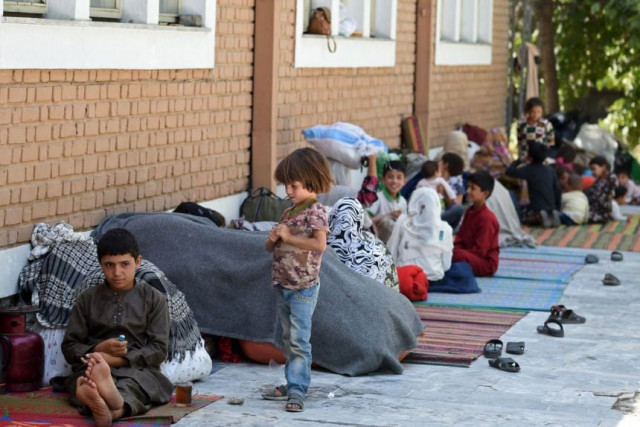In desperation, US scours for countries willing to house Afghan refugees
Biden administration exploring having Kazakhstan, Tajikistan and Uzbekistan take in thousands of applicants

President Joe Biden's administration has been holding secret talks with more countries than previously known in a desperate attempt to secure deals to temporarily house at-risk Afghans who worked for the U.S. government, four U.S. officials told Reuters.
The previously unreported discussions with such countries as Kosovo and Albania underscore the administration's desire to protect U.S.-affiliated Afghans from Taliban reprisals while safely completing the process of approving their U.S. visas.
With the Taliban tightening their grip on Afghanistan at a shockingly swift pace, the United States on Thursday announced it would send 1,000 personnel to Qatar to accelerate the processing of applications for Special Immigrant Visas (SIV).
Afghans who served as interpreters for the U.S. government and in other jobs are entitled to apply for the SIV program.
So far, about 1,200 Afghans have been evacuated to the United States and that number is set to rise to 3,500 in the coming weeks under "Operation Allies Refuge," with some going to a U.S. military base in Virginia to finalize their paperwork and others directly to U.S. hosts.
Fearful the Taliban's advances are raising the threat to SIV applicants still awaiting processing, Washington is seeking third countries to host them until their paperwork is done and they can fly to the United States.
"It is deeply troubling that there is no concrete plan in place to evacuate allies who are clearly in harm's way," said Krish O'Mara Vignarajah, president of the Lutheran Immigration and Refugee Service resettlement organization.
"It is baffling why the administration has been taking so long in order to secure these agreements," she said.
While there still are no third country agreements, a State Department spokesperson said, "We are evaluating all available options."
COUNTRIES HESITATE
Two U.S. officials, speaking on condition of anonymity, said countries were hesitant to take in the Afghans because of concerns about the quality of security vetting and health screening for COVID-19 before they were allowed to fly.
The Biden administration was exploring having Kazakhstan, Tajikistan and Uzbekistan take in thousands of applicants, but that effort has made little progress.
"There's concerns that you might expect: 'Who are these people? How do you know these people? Can you assure that these people will get visas to the United States? Who's going to care for and feed these people. What happens if these people wander off this facility you've got them in?" a senior State Department official said.
The official declined to confirm the countries in talks with the United States.
A deal to house about 8,000 Afghans in Qatar, which hosts a large U.S. military base, has been close for weeks, said a second U.S. official and another person familiar with the matter, but a formal agreement has yet to be announced.
Officials warn the pace of any potential agreements may be stymied by the rapidly changing Afghanistan situation.
U.S. Representative Jason Crow, who has led congressional efforts to speed SIV processing, said the administration should use a temporary U.S. troop deployment at Kabul airport for the drawdown of embassy staff to accelerate evacuations of SIV applicants irrespective of whether it has a third country deal.
At the same time, Crow, a former Army Ranger who served in Afghanistan, said it is very difficult to evacuate many SIV applicants and their families because they cannot reach Kabul.
"If you're not already in the Kabul security perimeter, getting there is very, very hard," he told Reuters. "That is a hard reality."
The reluctance of some countries has prompted the administration to appeal to others that may be willing to help if Washington provides some assistance, officials said.
The United States has offered economic and political concessions to Kosovo for taking in several thousand Afghans, but there is concern in Washington about its ability to house the Afghans, sources said.
The foreign ministry in Kosovo did not respond to a request for comment. The embassies of Albania, Kazakhstan, Tajikistan and Uzbekistan did not immediately respond to a request for comment.
'NOT GOING TO BE ABLE TO LEAVE'
The 1,200 Afghans evacuated are but a fraction of the 21,000 people in the SIV application pipeline and the Biden administration is still struggling to find temporary homes for the evacuees.
Advocates estimate the total number of evacuees under the SIV program at between 50,000 and 80,000 when family members are included.
James Miervaldis, chairman of the board of No One Left Behind, an organization that helps SIV applicants get to the United States, said there now appeared to be little chance that most of the SIV applicants will be evacuated.
"The math and the timeline just do not add up ... Those people are not going to be able to leave," said Miervaldis, an Army Reserve non-commissioned officer who served in Iraq and Afghanistan.
The issue has been closely watched by lawmakers in Congress, including Biden's allies.
"We have to follow through on our promises to the thousands of Afghans who risked their lives to help us. It's time for the Biden (administration) to cut the red tape and get this done," said Democratic congresswoman Sara Jacobs.



















COMMENTS
Comments are moderated and generally will be posted if they are on-topic and not abusive.
For more information, please see our Comments FAQ